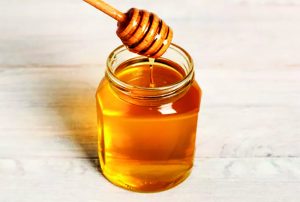Home News Guyana embarks on project to become “major producer” of honey
…Cuban team arrives to provide assistance
 On the crest of several new pursuits by Guyana to lead a robust agricultural sector is the latest undertaking to become a major producer of honey.
On the crest of several new pursuits by Guyana to lead a robust agricultural sector is the latest undertaking to become a major producer of honey.
A team from Cuba is currently in the country to examine how this can be realised, President Dr Irfaan Ali announced on Friday. Communities from the hinterland, coastland, and those near mangroves are set to benefit from this initiative.
The President underscored that given the country’s tropical nature and its cultivated crops, it can produce superior honey which can carry a heavy price.
Ali informed, “We are working with Cuba on the development of the honey industry. A team is here and will be working with our Indigenous communities, communities where we have mangroves, communities on the highway…so that we can become a major producer of honey. And not only honey, but because of the variation of our forest, our citrus cultivation and mangrove, it is different quality of honey.”
Guyana currently produces honey on a small scale but the Cuban specialists could assist greatly in setting up apiaries across the country.
Cuba sports a successful honey industry that is continuously growing. In 2021, record exports of 8500 tons were primarily destined for markets in western Europe, Canada, Japan, The Bahamas, and Martinique.
Agriculture Minister Zulfikar Mustapha had said earlier this month that the move to boost local honey production is timely, considering that Trinidad and Tobago is actively embarking on steps to remove barriers to trade to certain products, such as honey.
The Guyanese private sector has for years been lamenting about the various trade barriers in place by Trinidad and Tobago, which serves to block Guyanese exports to that market, and which are not being adequately addressed by the Caribbean Community’s (Caricom’s) Council for Trade and Economic Development (COTED).
Currently, Trinidad and Tobago’s honey and bee products are guided by the country’s archaic Food and Drug Act of 1960 and Beekeeping and Bee Products Act of 1935. According to the Beekeeping and Bee Products Act, only honey from the Windward and Leeward Islands can be transhipped to the twin-island Republic – something which Caricom Member States Guyana and Grenada have long been arguing goes against the Revised Treaty of Chaguaramas.
As recently as June, President Dr Irfaan Ali had reassured that the issues of honey trade between Guyana and Trinidad would be resolved.
“This is the challenge of being in the Region, you can’t give up. We have to have hope that it will change. I think there is a mood now, my own opinion is that there is a mood in the Region now to have these trade barriers and these challenges addressed, and I am very confident that that mood could bring us results,” the Head of State had told reporters on the sidelines of a high-level regional agriculture ministerial meeting held in Georgetown.
The Guyanese leader had noted that he even had discussions on this matter, and his Trinidadian counterpart, Prime Minister Keith Rowley had committed to having it addressed. (G12)
 On the crest of several new pursuits by Guyana to lead a robust agricultural sector is the latest undertaking to become a major producer of honey.
On the crest of several new pursuits by Guyana to lead a robust agricultural sector is the latest undertaking to become a major producer of honey.